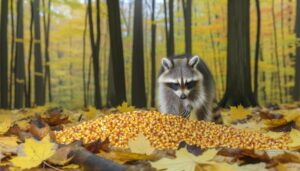Do Raccoons Eat Rotten Meat: 5 Facts
Raccoons (Procyon lotor) are omnivorous and exhibit highly adaptable feeding behaviors. They consume a wide range of foods including fruits, vegetables, small animals, and carrion.
Their natural scavenging tendencies permit the consumption of rotten meat, aided by robust immune systems and specialized digestive adaptations that tolerate spoiled food and neutralize pathogens. These habits assist in ecosystem cleanup by preventing disease spread and aiding nutrient recycling.
While consuming decomposed animal matter can pose health risks such as bacterial infections and parasitic infestations, raccoons' adaptability supports their survival across diverse environments. Learn more about their fascinating resilience and urban survival strategies.
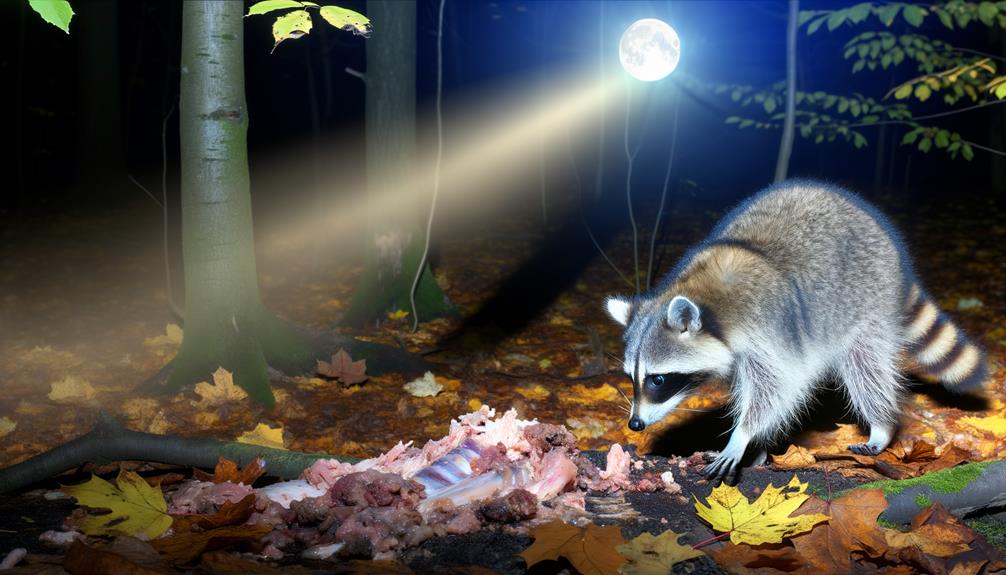
Key Takeaways
- Raccoons consume rotten meat due to their scavenging behavior and opportunistic feeding habits.
- They have specialized digestive adaptations allowing them to tolerate spoiled food.
- Their robust immune systems help neutralize pathogens in decomposed meat.
- Eating carrion aids in ecosystem cleanup by recycling nutrients and preventing disease spread.
- Raccoons' diverse diet includes a variety of meats, influenced by seasonal prey availability.
Raccoons' Dietary Preferences
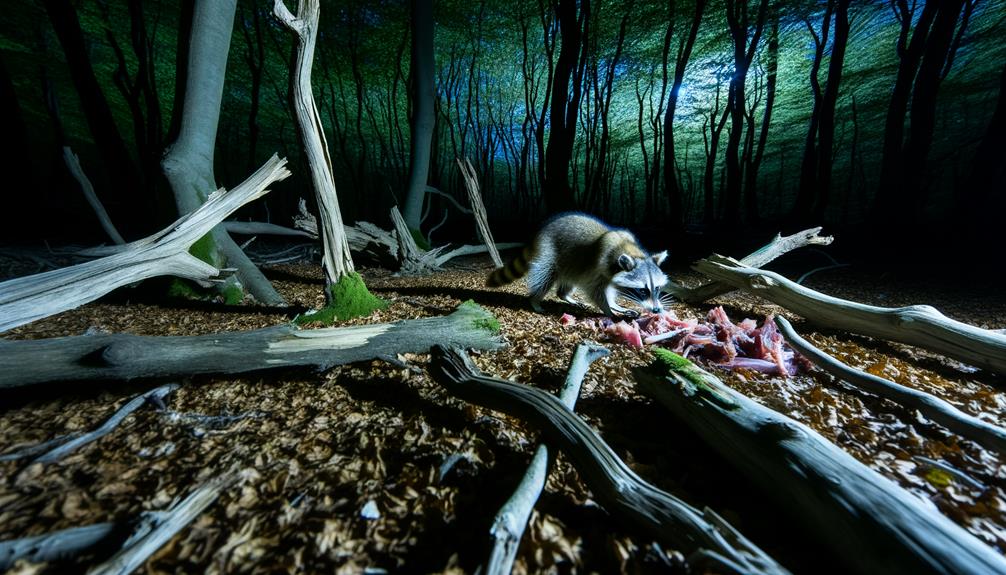
Raccoons exhibit omnivorous dietary preferences, consuming a wide range of food items including fruits, vegetables, insects, small animals, and human refuse. Their adaptable feeding habits enable them to thrive in various environments, from urban areas to dense forests.
Detailed observations indicate that raccoons' diets are influenced by seasonal availability; for instance, they mainly consume fruits and nuts in autumn and insects in spring. These dietary choices are also driven by the raccoon's opportunistic nature, allowing them to exploit whatever food resources are most readily accessible.
The inclusion of human refuse in their diet highlights their adaptability and opportunistic foraging behavior. This diverse diet reflects their ability to extract nutritional value from a variety of sources, ensuring their survival across different habitats.
Natural Scavenging Behavior
As opportunistic feeders, these mammals exhibit natural scavenging behavior that includes consuming carrion and other decomposing organic matter. This behavior is a survival strategy allowing raccoons to thrive in diverse environments.
Raccoons possess a highly developed sense of smell, enabling them to locate food sources that other animals might overlook. Their scavenging activities contribute to ecosystem balance by aiding in the decomposition process.
Observational studies indicate that raccoons are not selective when scavenging, ingesting a variety of decayed materials. This adaptability in their feeding habits underscores their resilience and versatility.
Understanding raccoons' scavenging behavior is essential for comprehending their ecological role and the dynamics of their interactions with both urban and natural habitats.
Meat Consumption in the Wild
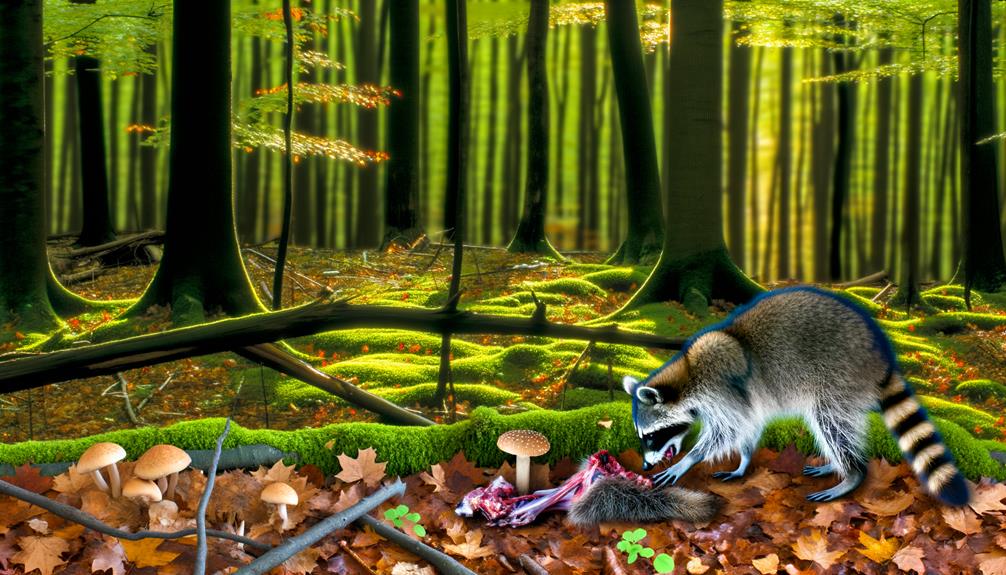
In natural habitats, the diet of Procyon lotor, commonly known as raccoons, includes a significant proportion of animal matter, highlighting their omnivorous and adaptable feeding behavior. Raccoons consume a diverse range of meats, including insects, small mammals, birds, amphibians, and fish. Their opportunistic nature allows them to exploit various food sources efficiently.
Seasonal availability of prey often influences their diet; for instance, amphibians and insects are more commonly consumed during warmer months. Additionally, raccoons exhibit keen scavenging skills, capitalizing on carrion and remains left by other predators.
This dietary plasticity not only supports their survival across diverse ecosystems but also underscores their role as both predators and scavengers within their ecological niches.
Tolerance to Spoiled Food
Raccoons exhibit notable tolerance to spoiled food, attributed to their specialized digestive adaptations and robust immune systems. Their digestive tracts are equipped to handle a variety of food sources, including decayed meat, which reduces the risk of foodborne illness.
Additionally, raccoons possess a strong immune response that mitigates the adverse effects of consuming spoiled items.
Digestive Adaptations
Due to their omnivorous diet and opportunistic feeding behavior, raccoons possess specific digestive adjustments that allow them to tolerate and even thrive on spoiled food. Their robust digestive system, equipped with strong stomach acids and a diverse microbial population, efficiently breaks down various food sources, including decomposing organic matter. These adaptations are essential for energy maximization from a fluctuating food supply. Particularly, raccoons have a higher tolerance for bacterial toxins compared to many other mammals, enabling them to consume food that would be harmful to other species.
| Digestive Adjustment | Function |
|---|---|
| Strong Stomach Acids | Break down tough, spoiled organic matter |
| Diverse Microbial Population | Aid in digestion and neutralization of toxins |
| High Tolerance to Bacterial Toxins | Enables consumption of decomposing food |
Immune System Strength
Possessing an extraordinarily resilient immune system, raccoons can effectively tolerate and neutralize pathogens present in spoiled food. This remarkable tolerance is attributed to several factors, including a high diversity of immune cells and robust production of antibodies.
Studies have shown that raccoons exhibit an enhanced ability to fend off bacterial and viral infections commonly found in decomposing organic matter. Moreover, their scavenging behavior has likely driven evolutionary adaptations, allowing them to consume a broad spectrum of food without succumbing to illness.
Unlike many other mammals, raccoons have evolved to possess a gastrointestinal tract that can handle high bacterial loads, thereby minimizing the risk of infections. This adaptation is vital for their survival in diverse and often harsh environments.
Health Impacts of Rotten Meat
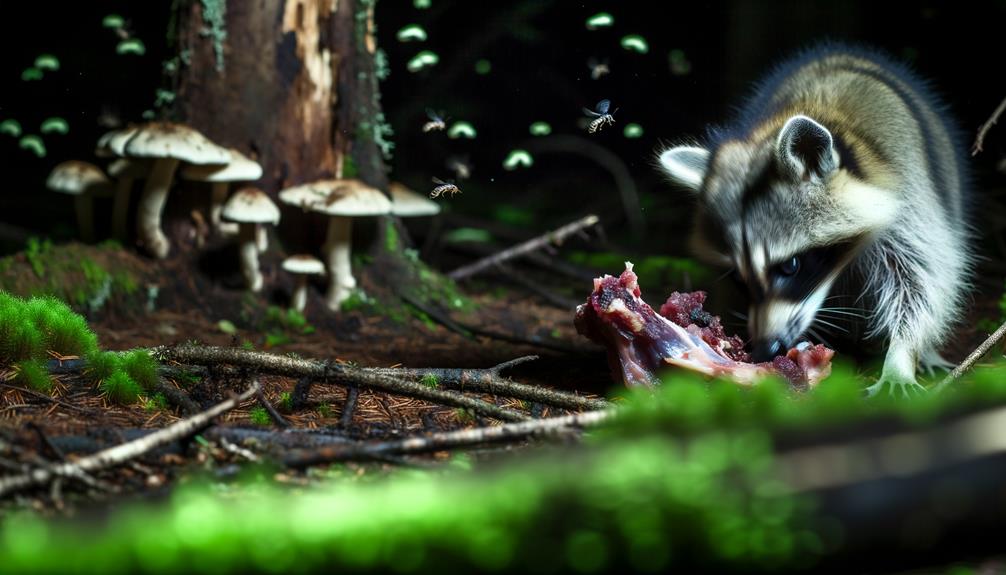
Consuming rotten meat can expose raccoons to a variety of pathogens and toxins, leading to significant health risks. The decomposition process fosters an environment for bacteria, fungi, and other microorganisms to proliferate, which can result in several adverse health effects for raccoons.
These potential health impacts include:
- Bacterial Infections: Pathogens like Salmonella and E. coli can cause severe gastrointestinal distress.
- Parasitic Infestations: Rotten meat can harbor parasites, including worms and protozoa, leading to parasitic diseases.
- Mycotoxin Exposure: Fungal growth on decaying meat can produce mycotoxins, which are toxic to many animal species.
- Nutritional Deficiency: Spoiled meat often loses essential nutrients, negatively impacting the raccoon's overall health and energy.
These risks underscore the potential dangers associated with the consumption of decomposed animal matter.
Comparing Fresh and Rotten Food
In contrast to the health risks posed by spoiled meat, fresh food provides raccoons with essential nutrients that support their overall well-being and energy. Fresh meat offers a higher content of proteins, vitamins, and minerals, essential for maintaining healthy bodily functions and robust immune responses.
Additionally, fresh fruits and vegetables supply necessary fiber and antioxidants, aiding in digestion and reducing oxidative stress. On the other hand, spoiled meat can harbor harmful bacteria and toxins, potentially leading to infections and adverse health effects. Observations indicate that raccoons prefer fresh food when available, as it ensures a more balanced diet.
This preference underscores the importance of fresh food in promoting optimal health and longevity in raccoon populations.
Factors Influencing Diet Choices
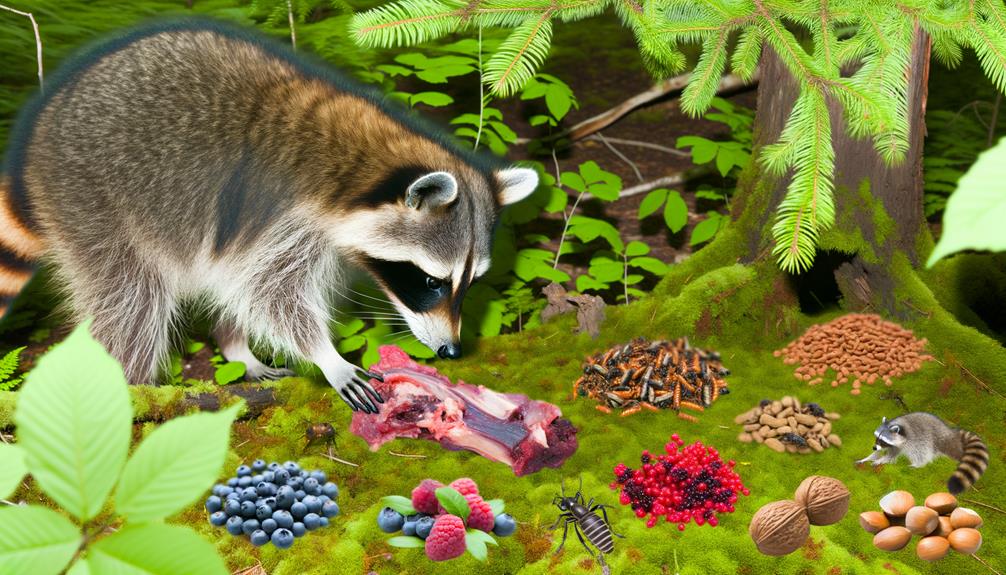
Several factors influence the diet choices of raccoons. These include the availability of food sources, seasonal changes, environmental conditions, and human activity. Raccoons are opportunistic feeders, adapting their diet based on what is readily available. Their dietary preferences can be influenced by a variety of elements:
- Availability of food sources: Raccoons consume fruits, nuts, insects, and small animals, adjusting their intake based on local resources.
- Seasonal changes: Different seasons offer varying food options, such as fruits in summer and nuts in autumn.
- Environmental conditions: Weather and habitat alterations can impact food accessibility, driving raccoons to adapt their eating habits.
- Human activity: Urbanization and waste provide additional food sources, often leading raccoons to scavenge in human habitats.
These factors collectively shape the dietary patterns of raccoons.
Role in Ecosystem Cleanup
Raccoons play a crucial role in ecosystem cleanup by scavenging and consuming carrion, thereby preventing the spread of disease and aiding in nutrient recycling. These omnivorous mammals are highly adaptable and exhibit generalized feeding behaviors, which include the consumption of decomposing animal matter.
By ingesting carrion, raccoons help to break down organic material, hence returning essential nutrients to the soil. This process supports plant growth and sustains other organisms within the ecosystem.
Additionally, raccoons' scavenging activities reduce the prevalence of potential pathogens that could proliferate in decaying animal remains. Their role as natural waste managers underscores their importance in maintaining ecological balance and promoting overall environmental health.
Survival Strategies in Urban Areas
While raccoons contribute to ecosystem cleanup in natural habitats, their remarkable adaptability also enables them to thrive in urban environments through various survival strategies. These omnivorous mammals exhibit a high degree of behavioral flexibility, allowing them to exploit a wide range of resources. Urban raccoons often capitalize on human waste and food leftovers, enhancing their survival prospects.
- Foraging in garbage bins: Raccoons frequently rummage through trash cans to find edible items.
- Utilizing storm drains: These animals often use storm drains and sewer systems for shelter and travel.
- Exploiting green spaces: Parks, gardens, and lawns offer additional feeding grounds.
- Adaptation to human activity: Raccoons are typically nocturnal, reducing direct encounters with humans while foraging.
These strategies underscore their ability to coexist with human development.
Observations From Wildlife Experts
In-depth studies conducted by wildlife experts reveal that raccoons exhibit highly opportunistic feeding behaviors, often consuming a wide variety of food sources, including occasionally ingesting rotten meat. Detailed observations indicate that raccoons are nocturnal foragers, utilizing their keen sense of smell to locate food.
They demonstrate minimal dietary discrimination, scavenging through refuse and natural settings alike. Field studies have documented instances where raccoons consume decomposing carcasses, suggesting a degree of tolerance for spoiled meat. This behavior is hypothesized to be a survival mechanism, allowing raccoons to exploit available resources, especially in environments where food scarcity is a concern.
Research also indicates that raccoons possess a relatively robust immune system, potentially enabling them to withstand pathogens present in decayed meat.
Implications for Human Interaction

Understanding the opportunistic feeding behaviors of raccoons is crucial due to their occasional consumption of rotten meat. This behavior has notable implications for human interaction and public health. These behaviors necessitate careful considerations to mitigate potential risks.
- Disease Transmission: Raccoons can carry diseases such as leptospirosis and rabies, which can be transmitted to humans and pets through contaminated environments.
- Garbage Management: Improperly secured waste can attract raccoons, increasing human-wildlife conflicts and the likelihood of disease spread.
- Pet Safety: Pets might come into contact with raccoons or their waste, posing health risks.
- Urban Planning: Designing urban areas with raccoon-proof waste disposal systems can reduce encounters and related health risks.
Proactive measures and public education can notably reduce these potential hazards.
Conclusion
Raccoons exhibit notable dietary flexibility, including a capacity to consume rotten meat, playing a significant role in ecosystem cleanup. Their scavenging behavior and high tolerance to spoiled food enable them to survive in diverse environments, including urban areas.
For instance, a study documented raccoons thriving in metropolitan settings by scavenging from waste bins, highlighting their adaptability and resilience. Understanding raccoons' dietary habits is important for managing human-wildlife interactions and mitigating potential health risks.



